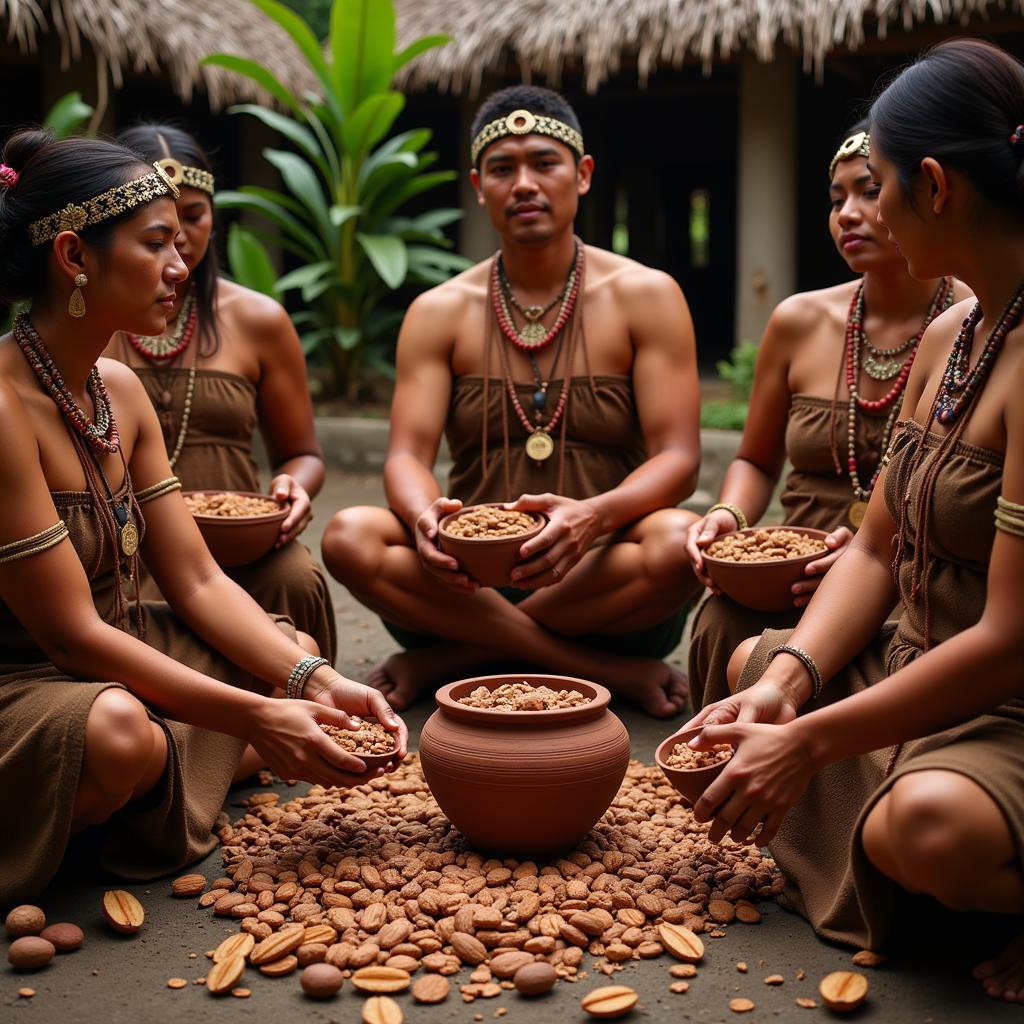The Cacao Society, encompassing the cultivation, trade, and consumption of cacao, plays a significant role in fostering cross-cultural understanding and promoting peace. From the ancient Mayan civilizations who revered cacao as a sacred drink to the modern-day chocolate industry that connects farmers and consumers across the globe, the story of cacao is intertwined with the pursuit of connection and harmony.
The Historical Significance of Cacao Societies
Cacao has been a cornerstone of various societies for centuries, shaping cultural practices, economic systems, and even spiritual beliefs. The Mayans, for example, developed elaborate rituals surrounding cacao consumption, believing it to be a divine gift that facilitated communication with the gods. They used cacao beans as currency, further highlighting their societal importance. This deep connection with cacao fostered a sense of community and shared identity.
Cacao as a Catalyst for Trade and Cultural Exchange
As cacao spread beyond Mesoamerica, it became a valuable commodity, driving trade routes and facilitating interactions between different cultures. The exchange of goods and ideas that accompanied the cacao trade contributed to a greater understanding and appreciation of diverse perspectives. This historical precedent underscores the power of cacao to bridge cultural divides.
 Mayan Cacao Ceremony
Mayan Cacao Ceremony
Cacao in the Modern World: Fostering Economic Empowerment and Sustainable Practices
Today, the cacao industry continues to impact societies globally, particularly in developing countries where cacao cultivation is a primary source of livelihood for millions of farmers. Fair trade practices and sustainable farming methods are becoming increasingly important, ensuring that cacao farmers receive fair compensation for their labor and that the environment is protected.
Empowering Women in Cacao Communities
Women play a vital role in cacao production, often taking on crucial tasks such as harvesting, fermenting, and drying the beans. Empowering women in cacao communities through education, access to resources, and leadership opportunities not only strengthens their economic independence but also contributes to the overall well-being of their families and communities. This empowerment has a ripple effect, fostering peace and stability at the local level.
From Bean to Bar: The Journey of Cacao and its Connection to Consumers
The journey of cacao from bean to bar is a complex process involving multiple stages and numerous individuals. Understanding this journey helps consumers appreciate the effort and dedication that goes into producing their favorite chocolate treats. This awareness can foster a sense of connection and shared responsibility, encouraging consumers to support ethical and sustainable practices within the cacao industry.
The Role of Conscious Consumption in Promoting Peace
By choosing to purchase chocolate from companies committed to fair trade and sustainable practices, consumers can actively contribute to a more just and equitable cacao society. This conscious consumption not only supports the livelihoods of cacao farmers but also promotes environmental sustainability and fosters peace within the global community.
Conclusion
The cacao society, past and present, demonstrates the power of shared resources and cultural exchange to build bridges between people. By supporting ethical and sustainable practices within the cacao industry, we can contribute to a more peaceful and interconnected world. Let’s continue to savor the deliciousness of chocolate while also recognizing its potential to foster positive change.
FAQ
- What is the historical significance of cacao?
- How does the cacao industry impact developing countries?
- What are fair trade practices in the cacao industry?
- How can consumers contribute to a more sustainable cacao society?
- What is the connection between cacao and peace?
- How did the Mayans use cacao?
- What is the role of women in cacao production?
Common Scenarios and Questions
Scenario: A consumer is unsure about which chocolate brands to buy.
Question: How can I identify chocolate brands that are committed to ethical and sustainable practices?
Scenario: A student is researching the history of cacao.
Question: What are some reliable resources for learning more about the Mayan use of cacao?
Further Exploration
Explore more articles on our website about fair trade, sustainable agriculture, and the role of women in developing countries.
For further assistance, please contact Phone Number: 02043854663, Email: [email protected] or visit us at Address: Khu 34, Bac Giang, 260000, Vietnam. We have a 24/7 customer service team.